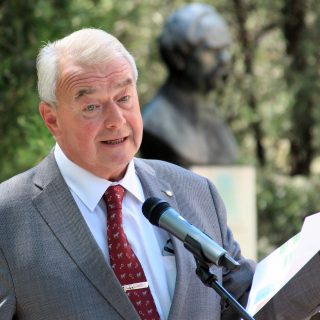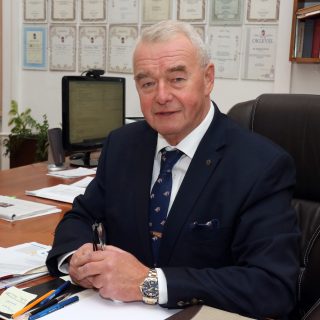2020 has been an extraordinary year in UVMB’s life too, but the education programme, which is always the university’s top priority, still went on according to the Rector’s newly developed protocol partly based on the students’ requests. As of 1st July, the University is funded by the Marek József Foundation, and the institution’s new founding charter allows for a much more efficient operation. Here’s the English summary of our interview with our Rector, Dr. Péter Sótonyi.
Addressing the virtual graduation ceremony, you called Covid-19 the hardest societal test of the past decades, and the fall semester seems to have confirmed your opinion. How did the university adapt to the pandemic?
 The reorganization of education was a great success in the spring. I can safely say that based on the feedback from my colleagues and the students. We started the fall semester in full swing, too. The only difference was that half of the students were attending the lectures at the university while the other half listened to them at home, alternating each week. The practicals were held as contact classes. In September, we had a magnificent opening ceremony for the academic year. In fact, it went so well, we may consider holding it there in the future, too.
The reorganization of education was a great success in the spring. I can safely say that based on the feedback from my colleagues and the students. We started the fall semester in full swing, too. The only difference was that half of the students were attending the lectures at the university while the other half listened to them at home, alternating each week. The practicals were held as contact classes. In September, we had a magnificent opening ceremony for the academic year. In fact, it went so well, we may consider holding it there in the future, too.
When the health emergency was declared in November, we had to introduce further restrictions. Lectures with personal presence were completely suspended but they are still held in the same lecture halls, just as the students requested. The teachers draw, project images and prepare the models in the same rooms, which gives the feeling of a real lecture. Manually intensive practical classes still require students to be present.
I met Student Council president Mátyás Ágics before this conversation, and he said this was requested by 70% of the students.
The Minister gave us the permission and I issued the order accordingly. Ours is the only higher education institution to allow students to participate in these practical classes. They didn’t have to move out of the dormitory, either. This is quite important because otherwise we wouldn’t be able to hold the practicals.
Have the foreign students returned?
Over 90 per cent of them are here! Many of them didn’t even go home after the spring semester. Of course, the education programme cannot go on without exams. The written and oral exams will be conducted online – the latter in the form of interactive conversations. Practical exams will be held with personal participation, if possible. We need to lay the greatest emphasis on the things that our students can learn even under these difficult conditions. It doesn’t mean that we are willing to make any unfair compromises or disregard the quality standards. I am sure we can find the golden middle ground.
I am highly impressed by the attitude of our students!
I can assure you that they’ve demonstrated an extraordinary commitment to learning and I fully integrated their wishes into the new protocol. I am proud to be their professor! I always say this so I might as well repeat it again: it’s the students who turn our university into the busy campus that is so pleasing to your heart and soul.
The education programme always has the top priority at the university, followed by research and then services. This order applies even more now; it cannot be changed. As far as graduate education is concerned, the personal presence of the teacher and the student is an absolute must because this is the way to pass on the university’s centuries-long ethos emanating from the Alma Mater, the “nurturing mother”.
Hungary is fighting to minimize the economic loss caused by the pandemic. How does the situation affect the university’s large infrastructural projects in the making?
I very much hope that the pandemic will not impact this area. The government issued a decree to carry out the construction of the new buildings and the renovation of the old ones according to the plans. The public procurement tender is in progress. If we can finish it successfully, construction will begin in the spring. We have worked out where to move the different departments: we will need to make do in a smaller space as long as the multi-billion-HUF construction goes on. Some departments and classes will be moved to the dormitory facility.
The government fully backs the university’s development. Our objective is no less than to become the best in the world. By the time the construction project finishes, we need to be prepared for it academically, too. I encourage our students and faculty members to stay and work at the university.
As the Eötvös Loránd Research Network’s vice president for life sciences, I submitted a motion to let the Institute for Veterinary Medical Research become independent from the Centre for Agricultural Research, and it was accepted. I would prefer the institute to join our university as an independent research institute, which would bring mutual benefits in education and research.
In an earlier interview, you said the university regained its independence in 2016, while this year’s model change helped it to restore its freedom. Can you see any advantages of the foundation model yet?
Quite a few! First of all, the university cannot function efficiently unless everybody pulls in the same direction, and we have created the conditions for that. The university is led by the rector who is personally responsible for carrying out the tasks identified by the Senate. Submitted by myself and adopted by the board, the new founding charter allows for a much more efficient operation than when they duplicated the leadership by setting up the Chancellorship. We are putting all our efforts into adjusting our policies to fully utilize the opportunities offered by the new model. The chancellor’s position was terminated, and the financial affairs are managed by the finance director who is subordinated to the rector and appointed by the Senate after an application process. I consider a less restricted management and operation as the foundation of academic autonomy. Of course, it is impossible without a board that acts as a partner and considers the university’s interest as the top priority. Our board is like that. The organizational units involved in services must help the operation of the educational units. In compliance with the legal regulations, we need to streamline the bureaucratic processes so that we can react quickly to any challenge.
Photos and interview by Gusztáv Balázs
